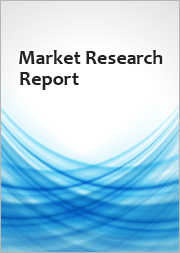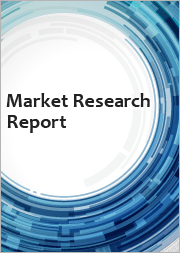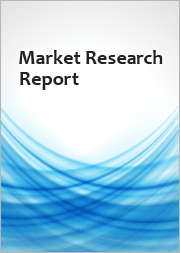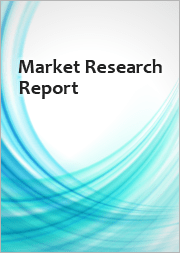
|
시장보고서
상품코드
1750313
커넥티드 패키징 시장 : 시장 기회, 성장 촉진요인, 산업 동향 분석, 예측(2025-2034년)Connected Packaging Market Opportunity, Growth Drivers, Industry Trend Analysis, and Forecast 2025 - 2034 |
||||||
세계의 커넥티드 패키징 시장은 2024년에 262억 달러로 평가되었고, 스마트 패키징 솔루션 수요 급증에 견인되어 CAGR 7.9%로 성장할 전망이며, 2034년에는 556억 달러에 이를 것으로 추정되고 있습니다.
하지만 세계 공급망은 무역관세, 특히 트럼프 정권이 중국의 수입품에 부과한 관세로 인해 혼란에 직면해 제조업체의 원료 비용을 인상하고 있습니다. RFID 칩과 스마트 라벨과 같은 구성 요소가 가격이 인상되어 기업의 이익률이 떨어졌습니다. 이를 상쇄하기 위해 제조사는 비용 상승분을 소비자에게 전가해 프리미엄 옵션 채택을 둔화시켰습니다. 그러나 이 관세 조치로 미국과 유럽 기업들은 커넥티드 패키징 솔루션의 현지 생산에 대한 투자를 늘리고 혁신을 촉진해 이익률을 향상시켰습니다.

기술은 커넥티드 패키징 시장에서 중요한 역할을 하고 있으며, QR 코드, NFC 태그, 증강현실(AR) 등이 점점 보급되고 있습니다. 이러한 기술을 통해 브랜드는 진정성 확인 및 상품 위치와 같은 상품 정보에 대한 접근을 제공함으로써 소비자를 실시간으로 끌어들일 수 있습니다. 그 결과, 소비자는 구매하는 제품을 신뢰할 수 있고, 기업은 브랜드 로열티 및 소비자 인게이지먼트의 향상으로부터 이익을 얻을 수 있습니다. 커넥티드 패키징은 제품의 추적성을 향상시키고 공급망의 투명성 및 안전성을 확보합니다.
| 시장 범위 | |
|---|---|
| 시작 연도 | 2024년 |
| 예측 연도 | 2025-2034년 |
| 시작 금액 | 262억 달러 |
| 예측 금액 | 556억 달러 |
| CAGR | 7.9% |
커넥티드 패키징 시장의 QR 코드 부문은 저비용, 확장성, 스마트폰과의 보편적인 호환성으로 인해 2024년에는 216억 달러로 평가되었고, 보급에 이상적인 것으로 되어 있습니다. QR코드를 통해 브랜드는 프로모션, 지속가능성 정보, 실시간 제품 상세 정보를 통해 고객의 관심을 끌 수 있습니다. 또한 제조에서 판매까지 공급망 전체를 통해 제품을 추적하는 데도 도움이 됩니다. 클라우드 기술과 통합된 선진 QR코드 시스템은 데이터 분석도 지원해 위조품 대책과 마케팅 활동의 개인화를 가능하게 합니다.
종이 및 골판지의 포장 재료 부문은 2024년에 110억 달러를 창출했습니다. 이 재료들은 가장 지속 가능하고 비용 대비 효과가 높은 것으로 여겨지며 QR코드나 NFC 태그 등 스마트 라벨 사용에 인기가 있습니다. 재활용 가능하고 경량인 성질은, 수송 비용의 삭감이나 친환경 포장 솔루션에 공헌하고 있습니다. 소비자들이 점점 더 지속가능성을 추구함에 따라 종이와 골판지 재료는 FMCG, 식품, 전자상거래 등의 부문 기업들에게 최적의 선택지가 되고 있습니다.
미국의 커넥티드 패키징 시장은 2024년에 72억 달러로 추정되며, 대폭적인 성장이 예상되고 있습니다. 이 시장 확대의 주요인은 DSCSA(Drug Supply Chain Security Act)와 같은 엄격한 위조방지법 시행이며, 이로 인해 커넥티드 패키징 솔루션에 대한 수요가 높아지고 있습니다. 이러한 법률은 제품의 진정성이 가장 중요한 의약품과 같은 산업에서는 특히 큰 영향을 미칩니다. 규제의 뒷받침뿐만 아니라 FMCG, 헬스케어, 로지스틱스 등의 부문에서 커넥티드 패키징이 널리 채택되고 있는 것도 시장을 더욱 전진시키고 있습니다.
세계의 커넥티드 패키징 산업의 주요 기업으로는 Sealed Air, Amcor plc, CCL Industries Inc., WestRock Company, Avery Dennison Corporation 등이 있습니다. 시장에서의 위상을 강화하기 위해 앰코나 에이버리 데니슨 같은 기업들은 스마트하고 지속가능한 포장 솔루션 통합에 점점 주력하고 있습니다. 이들 기업은 NFC와 QR코드 등 선진 기술에 투자하고 있으며, 이를 통해 소비자와의 참여를 강화하고 공급망의 투명성을 높이고 있습니다. 게다가 기업은 전자상거래 및 물류 제공업체와 제휴해, 트레이서빌리티의 향상과 안전한 제품 배송을 실현하고 있습니다. 재료의 재활용성과 지속가능성을 향상시킴으로써 기업은 친환경 제품에 대한 소비자의 수요 증가에 대응하고 있습니다. 더욱이 더 나은 추적과 인증을 위한 블록체인 기술의 채택은 제품의 무결성을 확보하면서 기업이 소비자의 신뢰를 쌓는데 도움을 주고 있습니다.
목차
제1장 조사 방법 및 범위
제2장 주요 요약
제3장 산업 인사이트
- 생태계 분석
- 트럼프 정권의 관세 분석
- 무역에 미치는 영향
- 무역량의 혼란
- 보복 조치
- 산업에 미치는 영향
- 공급측의 영향(원료)
- 가격 변동
- 공급망 재구성
- 생산 비용에 미치는 영향
- 수요측의 영향
- 최종 시장에 대한 가격 전달
- 시장 점유율 동향
- 소비자의 반응 패턴
- 공급측의 영향(원료)
- 영향을 받는 주요 기업
- 전략적인 산업 대응
- 공급망 재구성
- 가격 설정 및 제품 전략
- 시책관여
- 전망 및 향후 검토 사항
- 무역에 미치는 영향
- 산업에 미치는 영향요인
- 성장 촉진요인
- 스마트 포장 솔루션 수요 증가
- QR 코드, NFC 태그, 증강현실을 통한 소비자 참여
- 공급망의 가시성 및 효율성에 대한 요구 증가
- 전자상거래 활동 증가
- 산업의 잠재적 리스크 및 과제
- 높은 도입 비용이 채용율 제한
- 데이터 프라이버시 우려가 시장 성장 억제
- 성장 촉진요인
- 성장 가능성 분석
- 규제 상황
- 기술
- 장래 시장 동향
- 갭 분석
- Porter's Five Forces 분석
- PESTEL 분석
제4장 경쟁 구도
- 서문
- 기업의 시장 점유율 분석
- 주요 시장 기업의 경쟁 분석
- 경쟁 포지셔닝 매트릭스
- 전략 대시보드
제5장 시장 추정 및 예측 : 접속성 기술(2021-2034년)
- 주요 동향
- QR코드
- RFID
제6장 시장 추정 및 예측 : 포장재별(2021-2034년)
- 주요 동향
- 플라스틱
- 종이 및 골판지
- 유리
- 금속
- 기타
제7장 시장 추정 및 예측 : 최종 이용 산업별(2021-2034년)
- 주요 동향
- 음식
- 의약품 건강 관리
- 퍼스널케어 및 화장품
- 소비자용 전자 기기
- 기타
제8장 시장 추정 및 예측 : 지역별(2021-2034년)
- 주요 동향
- 북미
- 미국
- 캐나다
- 유럽
- 독일
- 영국
- 프랑스
- 스페인
- 이탈리아
- 네덜란드
- 아시아태평양
- 중국
- 인도
- 일본
- 호주
- 한국
- 라틴아메리카
- 브라질
- 멕시코
- 아르헨티나
- 중동 및 아프리카
- 사우디아라비아
- 남아프리카
- 아랍에미리트(UAE)
제9장 기업 프로파일
- AVERY DENNISON CORPORATION
- Amcor plc
- WestRock Company
- Sonoco Products Company
- Stora Enso
- Sealed Air
- CCL Industries Inc.
- Berry Global Inc.
- UPM
- DS Smith
- Mondi
- Constantia Flexibles
- UFlex Limited
- Tetra Laval Group
- Gerresheimer AG
- Printpack
- Greiner Packaging
The Global Connected Packaging Market was valued at USD 26.2 billion in 2024 and is estimated to grow at a CAGR of 7.9% to reach USD 55.6 billion by 2034, driven by the surge in demand for smart packaging solutions. However, the global supply chain has faced disruptions due to trade tariffs, particularly those imposed by the Trump administration on imports from China, raising the cost of raw materials for manufacturers. Components like RFID chips and smart labels saw price hikes, reducing profit margins for companies. To offset this, manufacturers passed on the higher costs to consumers, slowing down the adoption of premium connected packaging options. On a positive note, the tariffs prompted U.S. and European firms to boost investments in local manufacturing of connected packaging solutions, driving innovation and enhancing profit margins.
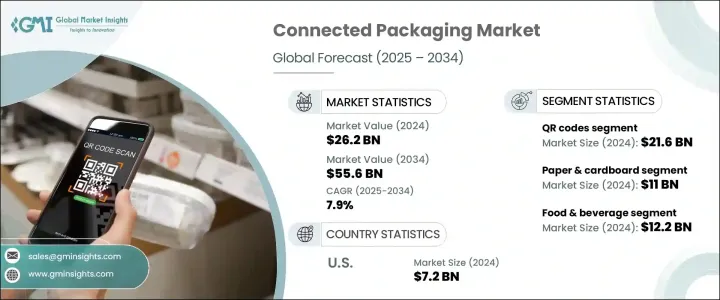
Technology plays a critical role in the connected packaging market, with QR codes, NFC tags, and augmented reality becoming increasingly popular. These technologies allow brands to engage consumers in real time by providing access to product information, such as authenticity verification and product location. As a result, consumers can trust the products they purchase, and companies benefit from improved brand loyalty and consumer engagement. Connected packaging enables better traceability of products, ensuring transparency and security in the supply chain.
| Market Scope | |
|---|---|
| Start Year | 2024 |
| Forecast Year | 2025-2034 |
| Start Value | $26.2 Billion |
| Forecast Value | $55.6 Billion |
| CAGR | 7.9% |
The QR codes segment in the connected packaging market was valued at USD 21.6 billion in 2024 due to its low cost, scalability, and universal compatibility with smartphones, making it ideal for widespread adoption. QR codes enable brands to engage customers through promotions, sustainability information, and real-time product details. They also help in tracking products throughout the supply chain, from manufacturing to the point of sale. Advanced QR code systems integrated with cloud technology also support data analytics, empowering companies to combat counterfeiting and personalize their marketing efforts.
The paper and cardboard packaging materials segment generated USD 11 billion in 2024. These materials are considered the most sustainable and cost-effective, making them popular for use with smart labels such as QR codes and NFC tags. Their recyclability and lightweight nature contribute to reduced shipping costs and eco-friendly packaging solutions. As consumers increasingly demand sustainability, paper and cardboard materials have become the go-to choice for companies in sectors like FMCG, food, and e-commerce.
U.S. Connected Packaging Market was estimated at USD 7.2 billion in 2024 and is poised for significant growth. A major driver of this expansion is the implementation of stringent anti-counterfeiting laws, such as the Drug Supply Chain Security Act (DSCSA), which have heightened the demand for connected packaging solutions. These laws are especially impactful in industries like pharmaceuticals, where product authenticity is paramount. In addition to the regulatory push, the widespread adoption of connected packaging in sectors like FMCG, healthcare, and logistics is further propelling the market forward.
Leading players in the Global Connected Packaging Industry include Sealed Air, Amcor plc, CCL Industries Inc., WestRock Company, and Avery Dennison Corporation. To strengthen their position in the market, companies like Amcor and Avery Dennison are increasingly focusing on integrating smart and sustainable packaging solutions. They are investing in advanced technologies such as NFC and QR codes, which allow for enhanced consumer engagement and increased transparency in the supply chain. Additionally, companies are partnering with e-commerce and logistics providers to improve traceability and secure product delivery. By improving the recyclability and sustainability of their materials, companies are aligning with rising consumer demand for eco-friendly products. Furthermore, the adoption of blockchain technology for better tracking and authentication is helping companies build consumer trust while ensuring product integrity.
Table of Contents
Chapter 1 Methodology and Scope
- 1.1 Market scope and definitions
- 1.2 Research design
- 1.2.1 Research approach
- 1.2.2 Data collection methods
- 1.3 Base estimates and calculations
- 1.3.1 Base year calculation
- 1.3.2 Key trends for market estimation
- 1.4 Forecast model
- 1.5 Primary research and validation
- 1.5.1 Primary sources
- 1.5.2 Data mining sources
Chapter 2 Executive Summary
- 2.1 Industry 360° synopsis
Chapter 3 Industry Insights
- 3.1 Industry ecosystem analysis
- 3.2 Trump administration tariffs analysis
- 3.2.1 Impact on trade
- 3.2.1.1 Trade volume disruptions
- 3.2.1.2 Retaliatory measures
- 3.2.2 Impact on the industry
- 3.2.2.1 Supply-side impact (raw materials)
- 3.2.2.1.1 Price volatility
- 3.2.2.1.2 Supply chain restructuring
- 3.2.2.1.3 Production cost implications
- 3.2.2.2 Demand-side impact
- 3.2.2.2.1 Price transmission to end markets
- 3.2.2.2.2 Market share dynamics
- 3.2.2.2.3 Consumer response patterns
- 3.2.2.1 Supply-side impact (raw materials)
- 3.2.3 Key companies impacted
- 3.2.4 Strategic industry responses
- 3.2.4.1 Supply chain reconfiguration
- 3.2.4.2 Pricing and product strategies
- 3.2.4.3 Policy engagement
- 3.2.5 Outlook and future considerations
- 3.2.1 Impact on trade
- 3.3 Industry impact forces
- 3.3.1 Growth drivers
- 3.3.1.1 Growing demand for smart packaging solutions
- 3.3.1.2 Consumer engagement through QR codes, NFC tags, and augmented reality
- 3.3.1.3 Increasing need for supply chain visibility and efficiency
- 3.3.1.4 Rise in e-commerce activities
- 3.3.2 Industry pitfalls and challenges
- 3.3.2.1 High implementation cost limits adoption rates
- 3.3.2.2 Data privacy concerns hinder market growth
- 3.3.1 Growth drivers
- 3.4 Growth potential analysis
- 3.5 Regulatory landscape
- 3.6 Technology landscape
- 3.7 Future market trends
- 3.8 Gap analysis
- 3.9 Porter's analysis
- 3.10 PESTEL analysis
Chapter 4 Competitive Landscape, 2024
- 4.1 Introduction
- 4.2 Company market share analysis
- 4.3 Competitive analysis of major market players
- 4.4 Competitive positioning matrix
- 4.5 Strategy dashboard
Chapter 5 Market Estimates & Forecast, By Connectivity Technology, 2021-2034 (USD Billion & Kilo Tons)
- 5.1 Key trends
- 5.2 QR codes
- 5.3 RFID
Chapter 6 Market Estimates & Forecast, By Packaging Material, 2021-2034 (USD Billion & Kilo Tons)
- 6.1 Key trends
- 6.2 Plastic
- 6.3 Paper & cardboard
- 6.4 Glass
- 6.5 Metal
- 6.6 Others
Chapter 7 Market Estimates & Forecast, By End Use Industry, 2021-2034 (USD Billion & Kilo Tons)
- 7.1 Key trends
- 7.2 Food & beverage
- 7.3 Pharmaceutical & healthcare
- 7.4 Personal care & cosmetics
- 7.5 Consumer electronics
- 7.6 Others
Chapter 8 Market Estimates and Forecast, By Region, 2021 – 2034 (USD Billion & Kilo Tons)
- 8.1 Key trends
- 8.2 North America
- 8.2.1 U.S.
- 8.2.2 Canada
- 8.3 Europe
- 8.3.1 Germany
- 8.3.2 UK
- 8.3.3 France
- 8.3.4 Spain
- 8.3.5 Italy
- 8.3.6 Netherlands
- 8.4 Asia Pacific
- 8.4.1 China
- 8.4.2 India
- 8.4.3 Japan
- 8.4.4 Australia
- 8.4.5 South Korea
- 8.5 Latin America
- 8.5.1 Brazil
- 8.5.2 Mexico
- 8.5.3 Argentina
- 8.6 Middle East and Africa
- 8.6.1 Saudi Arabia
- 8.6.2 South Africa
- 8.6.3 UAE
Chapter 9 Company Profiles
- 9.1 AVERY DENNISON CORPORATION
- 9.2 Amcor plc
- 9.3 WestRock Company
- 9.4 Sonoco Products Company
- 9.5 Stora Enso
- 9.6 Sealed Air
- 9.7 CCL Industries Inc.
- 9.8 Berry Global Inc.
- 9.9 UPM
- 9.10 DS Smith
- 9.11 Mondi
- 9.12 Constantia Flexibles
- 9.13 UFlex Limited
- 9.14 Tetra Laval Group
- 9.15 Gerresheimer AG
- 9.16 Printpack
- 9.17 Greiner Packaging






